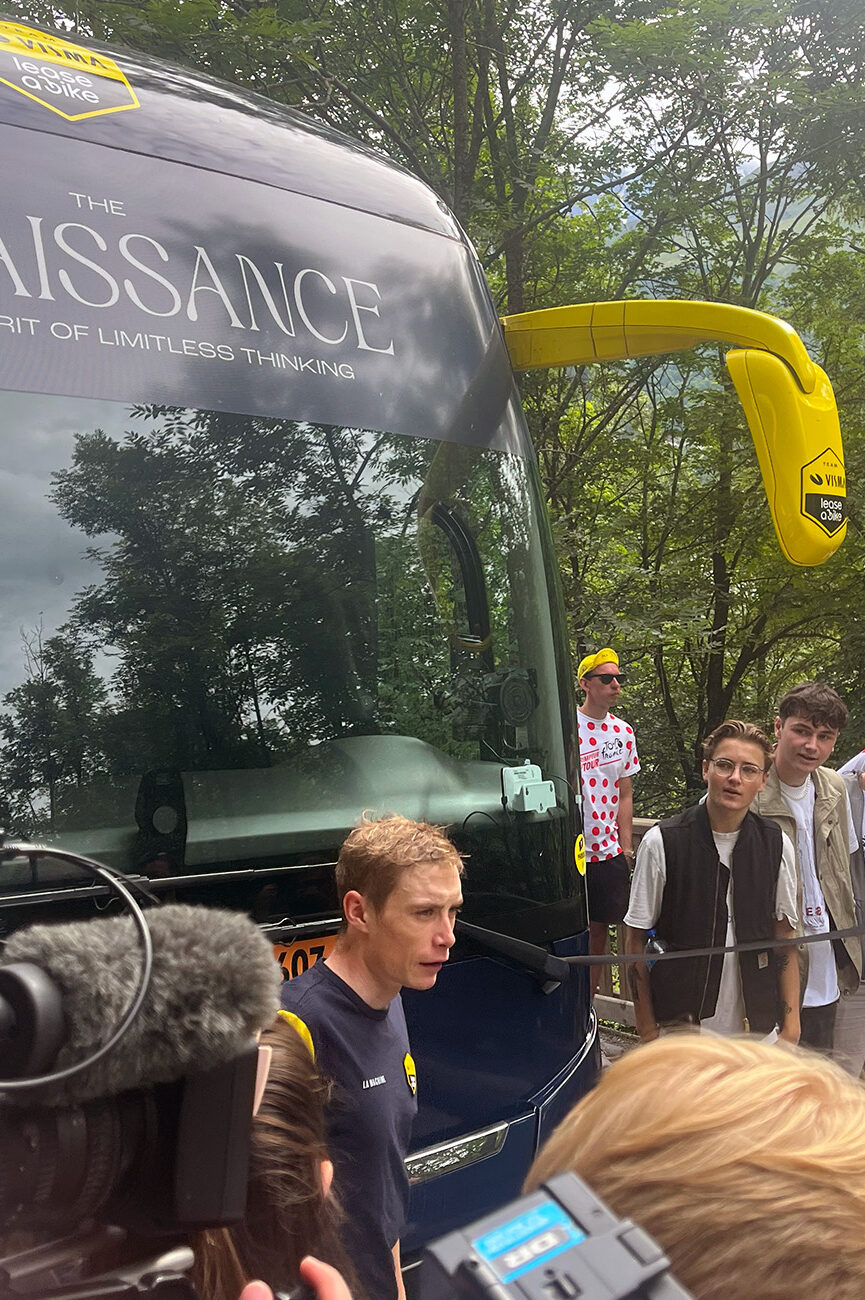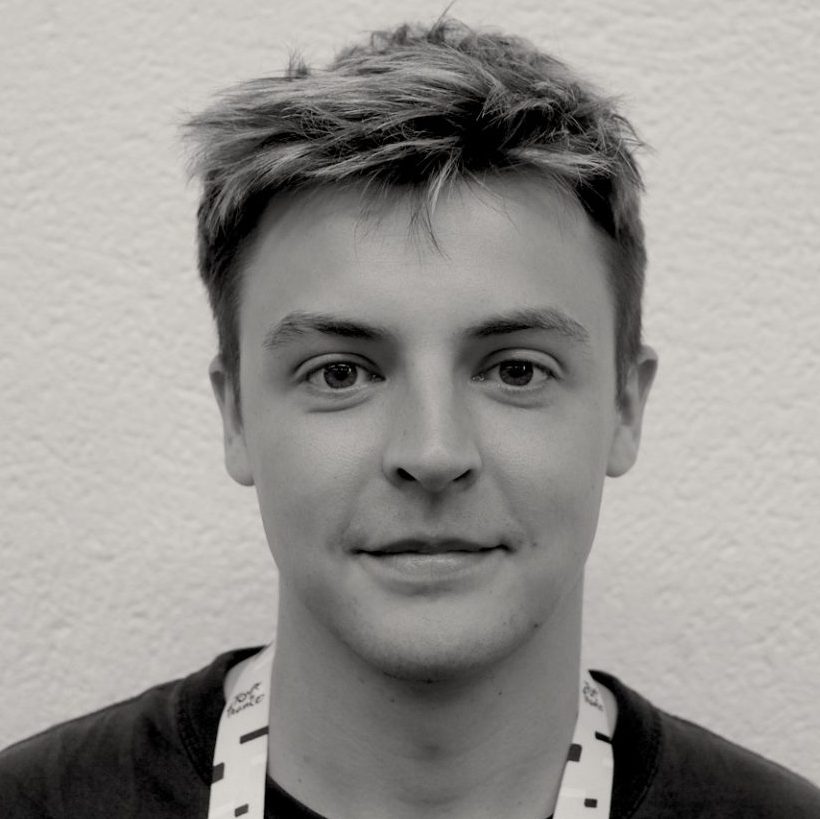The first thing you notice, after the chaos and noise of the Italian Grand Départ, is how quiet it is at the Visma-Lease a Bike bus of this first French finish at the 2024 Tour de France.
Jonas Vingegaard is warming down after losing 50 seconds to Tadej Pogačar on the Tour’s stage 4. Head on his stem, arms crossed over the handlebars. Sports director Frans Maassen is standing next to him, in bodyguard mode, with two to three dozen media standing the other side of the rope that gives the two-time race champion a very small amount of space to call his own in the aftermath of shipping almost a minute to Tadej Pogačar (UAE Team Emirates).
It’s a respectful silence, a dignified reverence, as one journalist standing next to me describes it.
Before long, Vingegaard unclips from his stationary bike, walks over to the bus and climbs on board. Don’t worry, we are told, he’ll be back out before long.
Instead, round the rear end of the vehicle, lurks sports director Arthur van Dongen, sniffed out by a couple of impatient reporters.
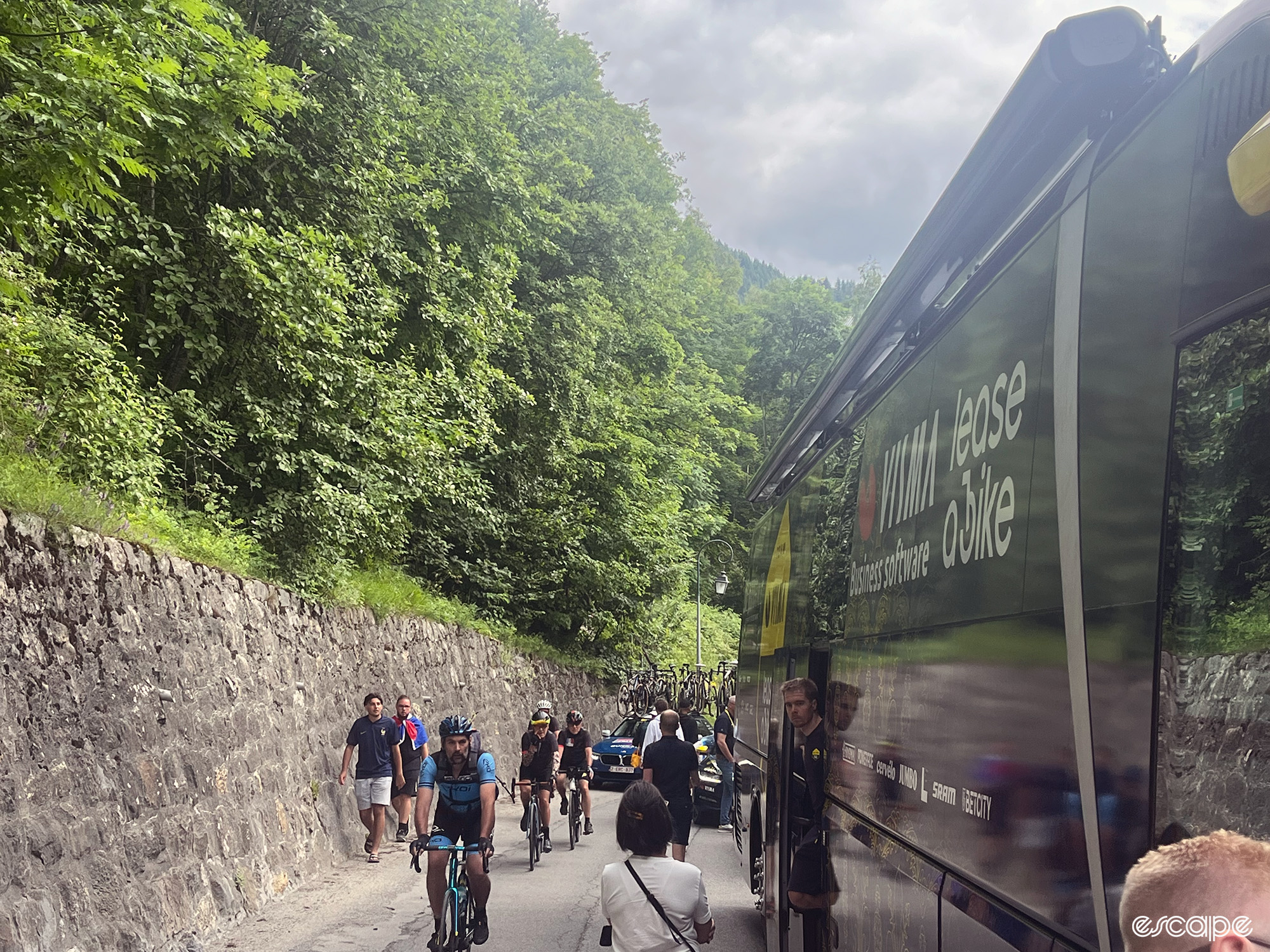
“The Tour is still long, it’s not over,” he estimates. “It’s not nice to lose time. A lot is coming up, the Tour is three weeks. It is what it is for the moment, we are not worrying.”
How was Jonas feeling today?
“There was no signal that he does not feel good today.”
Okay. Back around to the scrum. Another sports director, Grischa Niermann, gelled hair and shark tooth necklace, is reacquainting himself with how to do a conciliatory interview, having been a key part of the Grand Tour sweep last year.
“It’s 50 seconds of time loss, that’s not ideal,” Niermann began, swapping Netflix swearing for statements of facts in Valloire today. “We also knew this was within the possibilities. In the end we deal with what we have now and that’s 50 seconds shipped towards Pogačar. But I think if someone had told me last Friday [that] after four stages Jonas is 50 seconds behind that’s very good.
“This was the first time there was a really big mountain test,” he continued, getting the postmortem over and done with. “Jonas was good the first two days and he was very, very good today. There is one rider in the world that can take [time] away from Jonas on a day like today and that’s Tadej Pogačar. That doesn’t mean Jonas isn’t good.
“The times are taken on the finish line … we have to live with that and we also can live with that.”
Niermann explains that if Jonas had managed to hang on to Pogačar’s wheel over the top, it would have been much harder to drop the Dane: “If it’s one by one it is possible. Fair enough that they tried, bike racing is not only uphill.”
Plus, without Sepp Kuss present, and the versatile Matteo Jorgenson trying his best to learn the superdomestique role on the job, it’s not that surprising that Vingegaard was left isolated when a teammate could have masked the advantage Pogačar managed to pull out today.
“I think Matteo expected a bit more of himself … but he was up there,” Niermann said.
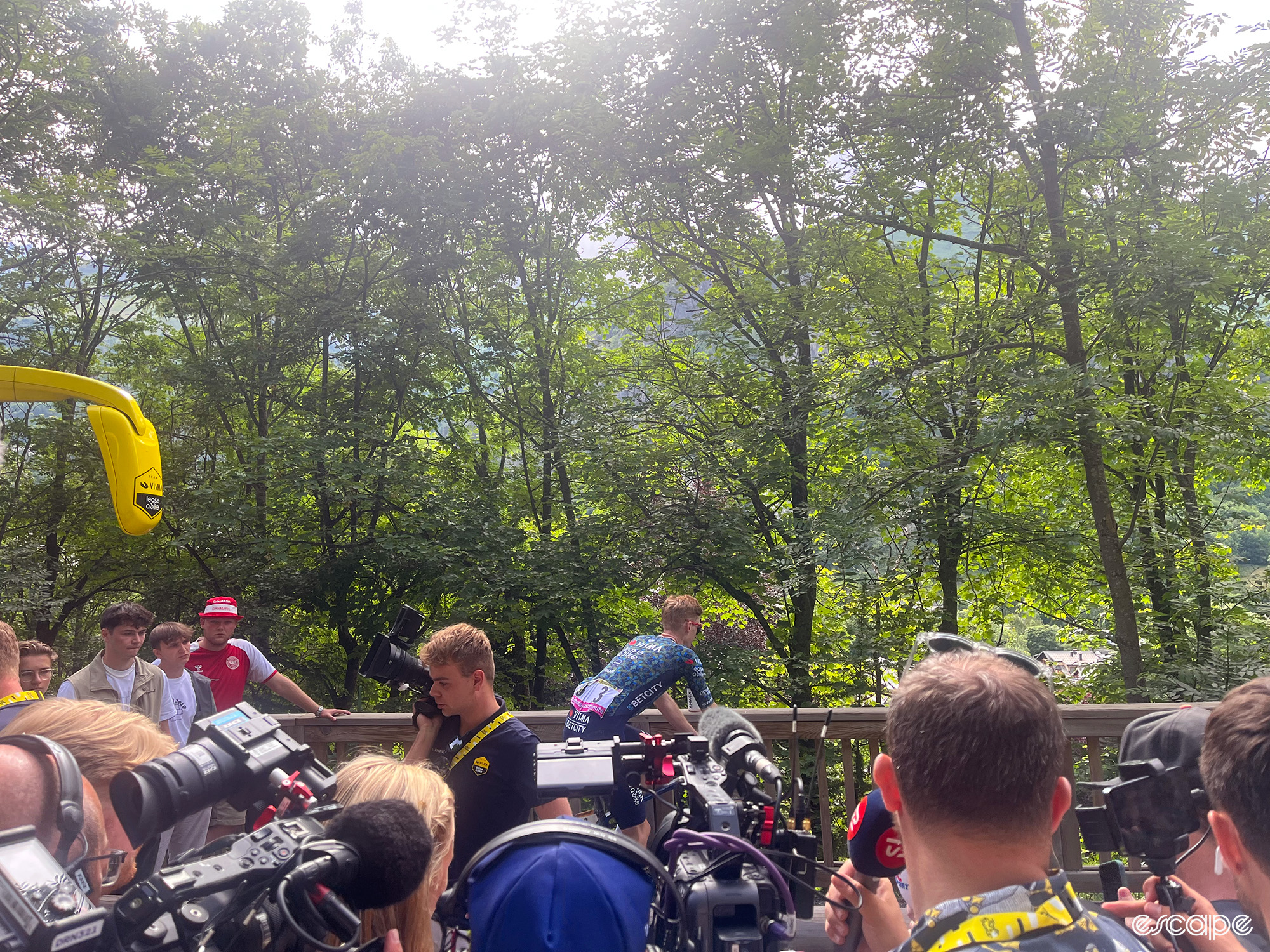
Jorgenson agreed, having warmed down looking out into the the mountainside canopy, away from the scrum, contemplating the day’s stage.”I didn’t think the numbers were anything ridiculous,” he said. “When I was looking at my power meter it wasn’t like I was doing anything, like, ‘Wow I can’t hold this pace.’ It was more within my limits, normally, but I just wasn’t on that great of the day.
“I think in general,” he continued, assessing the day’s stage, “Jonas could have used a harder pace just to reduce the explosivity of Pogačar and that’s kind of my bad for not being able to do it. But in the end that’s just how my legs were today.”
So what was the plan at the start of the day?
“We [had] wanted to set a hard pace on Galibier,” Jorgenson explained. “We wanted to make sure we set a really suffocating pace so we tried to minimise the explosivity of Pogačar but it was clear after the first kilometre of the [Col du] Lautaret that we just didn’t have the numbers to do it so we left it to UAE. I think the pace wasn’t quite hard enough, is what Jonas has just told me. That’s just how it is.”
Jorgenson was downbeat, his disappointment clear to see, whereas the sports directors were able to put a brave face on it, knowing there’s a lot of road left to race. Jorgenson, meanwhile, has thrust himself from Movistar into the best team in the peloton and is now under pressure (mostly from himself, you’d presume) to perform. And the bar is set quite high.
Eventually, the towering Jorgenson slinks back on to the bus, and Vingegaard slips back out, all media still in attendance, waiting to hear what went down from the person who was at the centre of all this fuss.
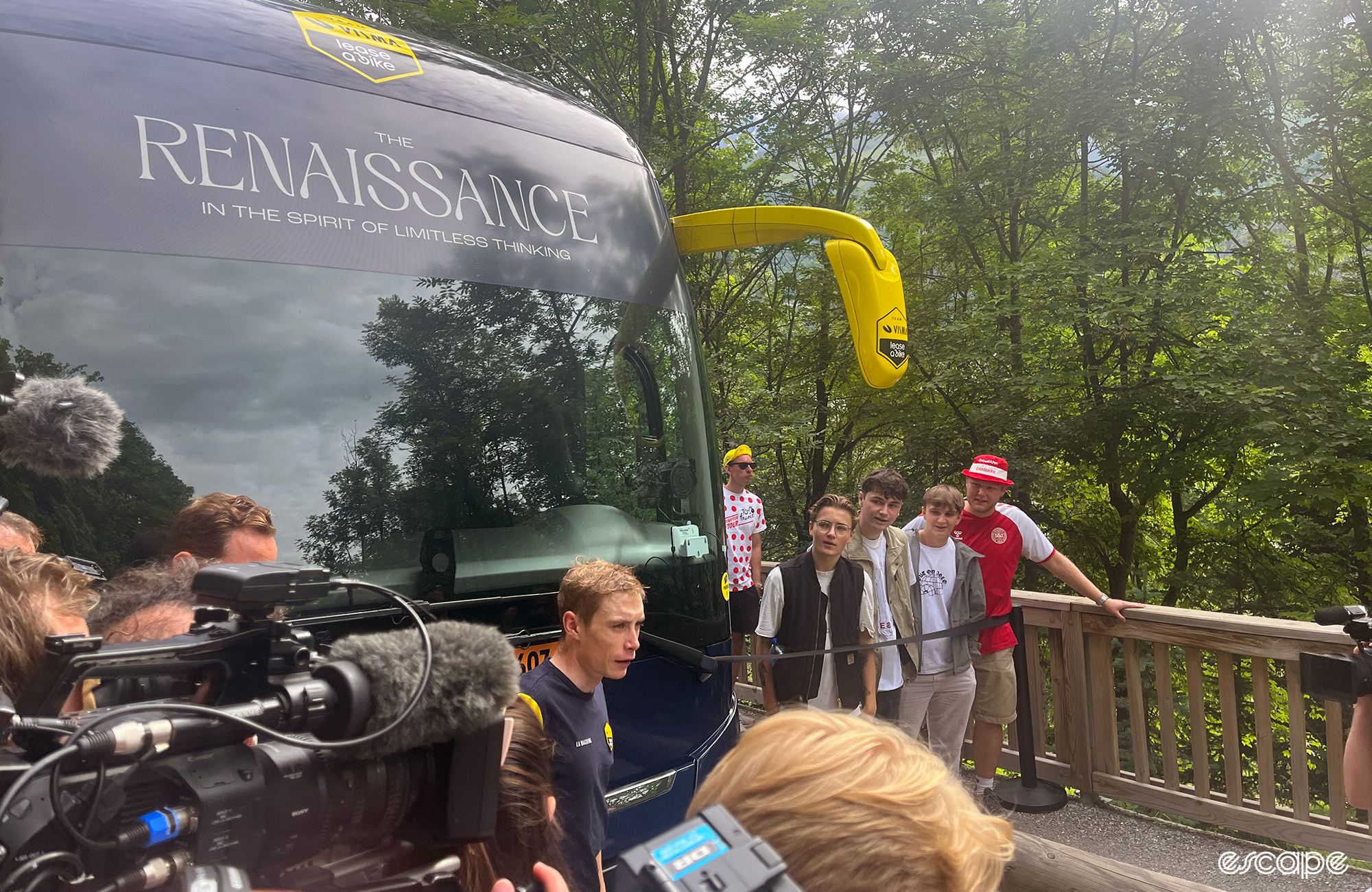
The Dane put a brave face on it, that much was clear. Regardless of reasonable expectation, he is a professional athlete, and those at his level don’t like to lose, whatever the circumstance. But part of being a champion is taking setbacks on the chin, promising to fight another day and deal with fluid situations somewhat out of your control. In a brutal sport such as bike racing, the fact Vingegaard has to put himself through three sets of interviews (one Danish, one in English with Dutch media, one in English with English-speaking media) and maintain a level of composure and serenity throughout is almost as impressive as the speeds he climbs and descends at.
“We came here believing we’d lose time in three of the first four stages, so to lose time on just one is pretty good in my opinion,” Vingegaard offered, putting a positive spin on things. “We thought we might lose two minutes or more, so only 50 seconds behind is quite good. Our time will come.”
“I was doubting myself going into this Tour but it’s not like he was a lot stronger uphill. I would have liked to close the gap instead of it opening. I would have liked to stay with him but that’s life,” Vingegaard continued.
“Most of the time I lost today was on the second part of the downhill, not the first, where weight matters a bit more. Pogačar has a bit more gravity that works for him and so he took time. I can only accept that.”
At the end of nearly 10 minutes of media, a defiant Vingegaard emerged, ready to make this Tour a contest and try, for the fourth year in a row, so blessed are all of us watching from the outside, to make this a closely fought race for the majority of the three weeks across France.
“The Tour is long and we’ll do our best,” he concluded. “We know what to do. We believe in our plan, like in the last two years and we’ll see at the end of the Tour.”
Either, we’ll see him mastermind a comeback against the odds considering everything that’s happened this year, or potentially morph into the gracious loser that endears the cycling public to him, as happened to Pogačar in 2022. A lot of race to run, a lot of character development to come.
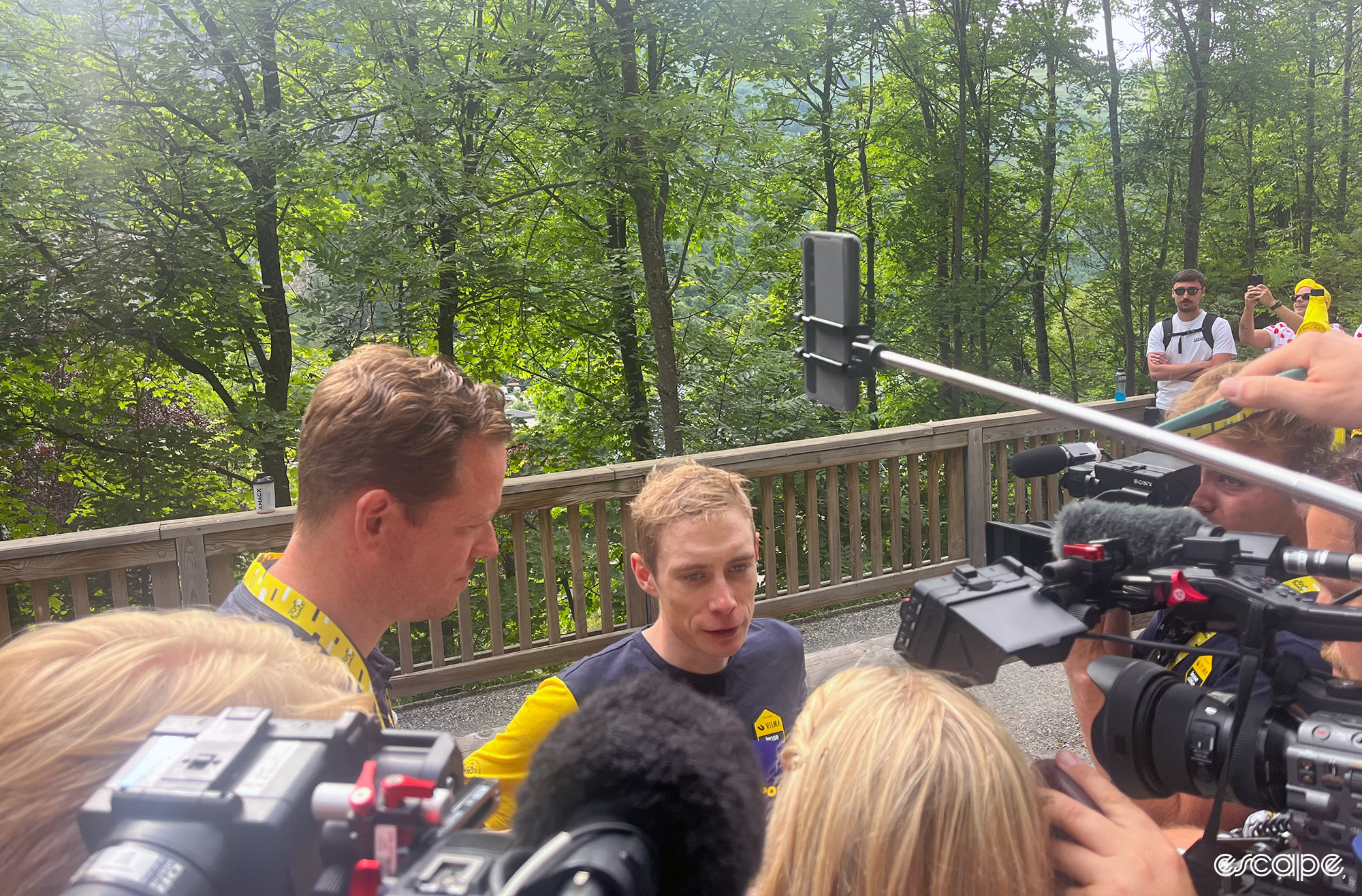
Did we do a good job with this story?
